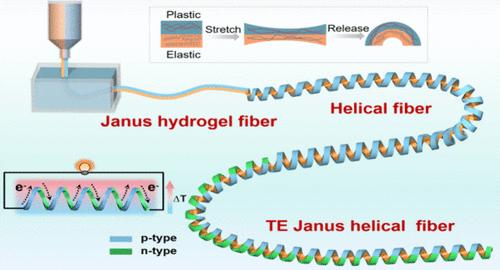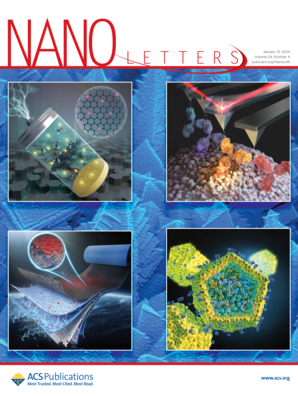Bioinspired Programmable and Ultrastretchable Janus Helical Hydrogel Fibers for Strain-Invariant Thermoelectric Body Heat Harvesting and Sensation
IF 9.6
1区 材料科学
Q1 CHEMISTRY, MULTIDISCIPLINARY
引用次数: 0
Abstract
Current fiber-based electronics often suffer from low stretchability and struggle to conform to complex and dynamic skin surfaces, resulting in significantly reduced performance in wearable devices. However, hydrogels with processability and adaptability permit conformity to diverse curved and uneven surfaces. Inspired by natural tendrils, we present Janus helical hydrogel fibers capable of completely maintaining the original thermoelectric performance under ultrahigh elastic strains. Janus helical fibers, composed of sodium polyacrylate (PANa) and PANa/single-walled carbon nanotube (PANa-SWCNT) hydrogels, are fabricated at scale and programmed with controllable diameters by utilizing the biological strain mismatch mechanism. The optimized fiber is ultrastretchable and has a master strain-invariant built-in temperature gradient as well as resistance, thus ensuring stable energy output even at 650% strain. The hydrogel fiber integrated with 90 pairs of p/n coils adaptively harvest heat, exhibiting a notable voltage density of 6.51 mV cm–2, and accurately perceive environmental temperatures (−176 μV/°C) undisturbed by body movements.

求助全文
约1分钟内获得全文
求助全文
来源期刊

Nano Letters
工程技术-材料科学:综合
CiteScore
16.80
自引率
2.80%
发文量
1182
审稿时长
1.4 months
期刊介绍:
Nano Letters serves as a dynamic platform for promptly disseminating original results in fundamental, applied, and emerging research across all facets of nanoscience and nanotechnology. A pivotal criterion for inclusion within Nano Letters is the convergence of at least two different areas or disciplines, ensuring a rich interdisciplinary scope. The journal is dedicated to fostering exploration in diverse areas, including:
- Experimental and theoretical findings on physical, chemical, and biological phenomena at the nanoscale
- Synthesis, characterization, and processing of organic, inorganic, polymer, and hybrid nanomaterials through physical, chemical, and biological methodologies
- Modeling and simulation of synthetic, assembly, and interaction processes
- Realization of integrated nanostructures and nano-engineered devices exhibiting advanced performance
- Applications of nanoscale materials in living and environmental systems
Nano Letters is committed to advancing and showcasing groundbreaking research that intersects various domains, fostering innovation and collaboration in the ever-evolving field of nanoscience and nanotechnology.
 求助内容:
求助内容: 应助结果提醒方式:
应助结果提醒方式:


